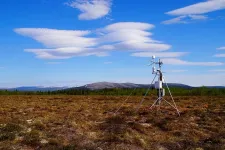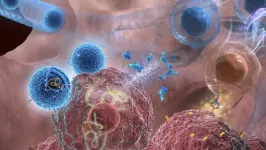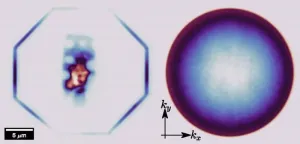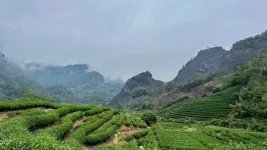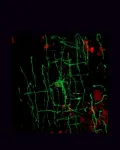(Press-News.org) Irvine, Calif., Feb. 15, 2024 – Throughout human history, technologies have been used to make peoples’ lives richer and more comfortable, but they have also contributed to a global crisis threatening Earth’s climate, ecosystems and even our own survival. Researchers at the University of California, Irvine, the University of Kansas and Oregon State University have suggested that industrial civilization’s best way forward may entail embracing further technological advancements but doing so with greater awareness of their potential drawbacks.
In a paper titled “Scientists’ Warning on Technology,” published recently in the Journal of Cleaner Production, the researchers, including Bill Tomlinson, UCI professor of informatics, stress that innovations, particularly in the fields of clean energy and artificial intelligence, will come with risks but may be the most effective way to ensure a sustainable future.
“Since prehistoric times, technologies have been created to solve problems and benefit people; think of the improvements that have been made in agriculture, manufacturing and transportation,” Tomlinson said. “But these developments have had a dual nature. While addressing the human need for food, farming has led to environmental degradation, and our factories and vehicles have caused a massive buildup of atmospheric carbon dioxide, which is causing climate change.”
Co-author Andrew W. Torrance, the Paul E. Wilson Distinguished Professor of Law at the University of Kansas, said: “Technology is often offered as a panacea for environmental crises. It is not. Nevertheless, it will play a crucial role in any solution. That is why the role of technology must be taken seriously, rigorously measured, modeled and understood – and then interpreted in light of population and affluence.”
He added, “I am extremely optimistic about the beneficial role technology could play in helping humanity find its sustainable niche in the biosphere, but [I’m also] stone-cold sober that other, less hopeful outcomes remain possible.”
The scientists’ warning concept dates to the early 1990s, when the Union of Concerned Scientists published a letter exhorting people to change their habits regarding stewardship of Earth and its resources “if vast human misery is to be avoided and our global home on this planet is not to be irretrievably mutilated.” A second warning, in 2017, was signed by more than 15,000 scholars in different scientific fields. Since then, dozens of additional admonitions have been published, with over 50 currently in preparation.
“The scientists’ warnings weave a compelling narrative of humanity at a crossroads, urging us to acknowledge the fragility of our biosphere and embrace a collective responsibility for safeguarding our future through proper, science-based actions,” said co-author William Ripple, Oregon State University Distinguished Professor of ecology, who led the project to write the article.
The Journal of Cleaner Production warning outlines two main methods for reducing, mitigating or eliminating fossil fuel use. The first is infrastructural substitution, replacing coal- and natural gas-fired power plants with renewable resources such as wind and solar, and abandoning internal combustion engines in favor of electric motors. This shift would also involve widespread adoption of electric appliances in homes and swapping out gas furnaces and water heaters for heat pumps.
A second method to steer humanity away from fossil fuel burning centers on a concept known as “undesign,” the intentional negation of technology and consideration of alternatives that do not rely on labor-saving human inventions.
“People are often resistant to change, though, especially in contexts where they have come to depend strongly on particular goods and services,” Tomlinson said. “Embracing undesign will require people to be guided to new cultural narratives that are not so reliant on heavily impactful systems.”
In addition to clean energy technologies, the warning’s authors look to artificial intelligence as a way to point human civilization toward a more sustainable tomorrow. They mention how AI is being used currently to connect wildlife habitats, monitor methane emissions and optimize supply chains. Tomlinson and his colleagues said AI presents far less energy-intensive alternatives to laborious tasks like writing and illustration and is becoming adept at writing computer code, which could come in handy in managing the “complexities of 8 billion-plus people cohabiting on Earth,” according to the paper.
But Tomlinson noted that AI is not without risks, such as the possibility of runaway energy consumption, perpetuating biases in human societies and AI systems becoming independent and powerful enough that they pose a real danger to humanity.
“It’s important that humans deploy new technologies to replace those that are environmentally harmful,” he said. “But we need to remain vigilant for potential future harm and attempt to mitigate that as much as possible.
“In our scientists’ warning, we identify an array of potential future risks from both electrification and AI. We believe that these outcomes are substantially less problematic than these technologies’ potential benefits from addressing the pressing environmental crises that humanity is currently facing.”
This project received funding from the National Science Foundation.
About the University of California, Irvine: Founded in 1965, UCI is a member of the prestigious Association of American Universities and is ranked among the nation’s top 10 public universities by U.S. News & World Report. The campus has produced five Nobel laureates and is known for its academic achievement, premier research, innovation and anteater mascot. Led by Chancellor Howard Gillman, UCI has more than 36,000 students and offers 224 degree programs. It’s located in one of the world’s safest and most economically vibrant communities and is Orange County’s second-largest employer, contributing $7 billion annually to the local economy and $8 billion statewide. For more on UCI, visit www.uci.edu.
Media access: Radio programs/stations may, for a fee, use an on-campus ISDN line to interview UCI faculty and experts, subject to availability and university approval. For more UCI news, visit news.uci.edu. Additional resources for journalists may be found at https://news.uci.edu/media-resources.
END
UC Irvine researcher co-authors ‘scientists’ warning’ on climate and technology
Academics explore roles of clean energy and AI in combating global warming
2024-02-15
ELSE PRESS RELEASES FROM THIS DATE:
Methane emissions from wetlands increase significantly over high latitudes
2024-02-15
– By Julie Bobyock
Wetlands are Earth’s largest natural source of methane, a potent greenhouse gas that is about 30 times more powerful than carbon dioxide at warming the atmosphere. A research team from the Department of Energy’s Lawrence Berkeley National Laboratory (Berkeley Lab) analyzed wetland methane emissions data across the entire Boreal-Arctic region and found that these emissions have increased approximately nine percent since 2002.
Livestock and fossil fuel production are well studied for their role in releasing tons of methane per year into the atmosphere. Although more uncertain, quantifying natural wetlands emissions is important to predicting climate ...
Study finds new inhalable therapy is a big step forward in lung cancer research
2024-02-15
Lung cancer is one of the most common cancers and has one of the lowest survival rates in the world. Cytokines, which are small signaling proteins, such as interleukin-12 (IL-12), have demonstrated considerable potential as robust tumor suppressors. However, their applications are limited due to a multitude of severe side effects.
In a paper published Jan. 11 by Nature Nanotechnology, Biomedical Engineering Professor Ke Cheng and his research group demonstrate that using nanobubbles, ...
Damon Runyon Cancer Research Foundation awards $3.2 million to innovative early-career scientists
2024-02-15
The Damon Runyon Cancer Research Foundation has announced eight recipients of the 2024 Damon Runyon-Rachleff Innovation Award, established to support “high-risk, high-reward” ideas with the potential to significantly impact the prevention, diagnosis, or treatment of cancer. Five extraordinary early-career researchers will receive initial grants of $400,000 over two years, and each will have the opportunity to receive two additional years of funding (for a potential total of $800,000). This year, this “Stage 2” continuation ...
Scientific report reveals livestock as the key factor in cheatgrass spread
2024-02-15
For Immediate Release
Contact: Erik Molvar, Western Watersheds Project, 307-399-7910
Roger Rosentreter, Bureau of Land Management, Botanist (Retired), 208-991-8815
Don Mansfield, Emeritus Professor of Biology, College of Idaho, 208-871-8170
Scientific Report Reveals Livestock Grazing as the Key Factor in Cheatgrass Spread
HAILEY, Ida. (February 15, 2024) – A scientific report released today illuminates the causes of cheatgrass spread and compares the effectiveness ...
NRL discovers two-dimensional waveguides
2024-02-15
WASHINGTON – The U.S. Naval Research Laboratory (NRL), in collaboration with Kansas State University, announce the discovery of slab waveguides based on the two-dimensional material hexagonal boron nitride. This milestone has been reported in the journal Advanced Materials.
Two-dimensional (2D) materials are a class of materials which can be reduced to the monolayer limit by mechanically peeling the layers apart. The weak interlayer attractions, or van der Waals attraction, allows the layers to be separated via the so-called ...
AIBS names 2024 emerging public policy leaders
2024-02-15
The American Institute of Biological Sciences (AIBS) is pleased to announce that Alex Rich and Efraín Rodríguez-Ocasio have been selected to receive the 2024 AIBS Emerging Public Policy Leadership Award (EPPLA). The award recognizes graduate students in the biological sciences who have demonstrated leadership skills and an aptitude for working at the intersection of science and public policy.
Alex Rich is a Ph.D. student in neuroscience at Yale University in New Haven, Connecticut. Her research focuses on decision-making and disordered ...
Shuffling the deck for privacy
2024-02-15
By integrating an ensemble of privacy-preserving algorithms, a KAUST research team has developed a machine-learning approach that addresses a significant challenge in medical research: How to use the power of artificial intelligence (AI) to accelerate discovery from genomic data while protecting the privacy of individuals.[1]
“Omics data usually contains a lot of private information, such as gene expression and cell composition, which could often be related to a person’s disease or health status,” says KAUST’s Xin Gao. “AI models trained on this data – particularly deep learning models – have the potential to retain private ...
Root microbes may be the secret to a better tasting cup of tea
2024-02-15
You’d think the complex flavor in a quality cup of tea would depend mainly on the tea varieties used to make it. But a study appearing in the journal Current Biology on February 15 shows that the making of a delicious cup of tea depends on another key ingredient: the collection of microbes found on tea roots. By altering that assemblage, the authors showed that they could make good-quality tea even better.
“Significant disparities in microbial communities, particularly nitrogen metabolism-related microorganisms, were identified in the roots of tea plants with varying qualities through ...
Winners of 4th annual Rising Black Scientists Awards announced
2024-02-15
Cell Press, Cell Signaling Technology (CST), and the Elsevier Foundation are proud to announce the winners of the 4th annual Rising Black Scientists Awards: Jaye Wilson of Yale University, Kevin Brown Jr. of California State University San Marcos, Senegal Mabry of Cornell University, and Akorfa Dagadu of the Massachusetts Institute of Technology.
This year had the greatest number of submissions thus far, with the winners being selected from a pool of more than 350 applicants from across the life, health, physical, earth, environmental, and data sciences. Essays from the winners and honorees appear in the journals Cell and ...
Ancient retroviruses played a key role in the evolution of vertebrate brains
2024-02-15
Researchers report February 15 in the journal Cell that ancient viruses may be to thank for myelin—and, by extension, our large, complex brains. The team found that a retrovirus-derived genetic element or “retrotransposon” is essential for myelin production in mammals, amphibians, and fish. The gene sequence, which they dubbed “RetroMyelin,” is likely a result of ancient viral infection, and comparisons of RetroMyelin in mammals, amphibians, and fish suggest that retroviral infection and genome-invasion ...
LAST 30 PRESS RELEASES:
Celebrity dolphin of Venice doesn’t need special protection – except from humans
Tulane study reveals key differences in long-term brain effects of COVID-19 and flu
The long standing commercialization challenge of lithium batteries, often called the dream battery, has been solved.
New method to remove toxic PFAS chemicals from water
The nanozymes hypothesis of the origin of life (on Earth) proposed
Microalgae-derived biochar enables fast, low-cost detection of hydrogen peroxide
Researchers highlight promise of biochar composites for sustainable 3D printing
Machine learning helps design low-cost biochar to fight phosphorus pollution in lakes
Urine tests confirm alcohol consumption in wild African chimpanzees
Barshop Institute to receive up to $38 million from ARPA-H, anchoring UT San Antonio as a national leader in aging and healthy longevity science
Anion-cation synergistic additives solve the "performance triangle" problem in zinc-iodine batteries
Ancient diets reveal surprising survival strategies in prehistoric Poland
Pre-pregnancy parental overweight/obesity linked to next generation’s heightened fatty liver disease risk
Obstructive sleep apnoea may cost UK + US economies billions in lost productivity
Guidelines set new playbook for pediatric clinical trial reporting
Adolescent cannabis use may follow the same pattern as alcohol use
Lifespan-extending treatments increase variation in age at time of death
From ancient myths to ‘Indo-manga’: Artists in the Global South are reframing the comic
Putting some ‘muscle’ into material design
House fires release harmful compounds into the air
Novel structural insights into Phytophthora effectors challenge long-held assumptions in plant pathology
Q&A: Researchers discuss potential solutions for the feedback loop affecting scientific publishing
A new ecological model highlights how fluctuating environments push microbes to work together
Chapman University researcher warns of structural risks at Grand Renaissance Dam putting property and lives in danger
Courtship is complicated, even in fruit flies
Columbia announces ARPA-H contract to advance science of healthy aging
New NYUAD study reveals hidden stress facing coral reef fish in the Arabian Gulf
36 months later: Distance learning in the wake of COVID-19
Blaming beavers for flood damage is bad policy and bad science, Concordia research shows
The new ‘forever’ contaminant? SFU study raises alarm on marine fiberglass pollution
[Press-News.org] UC Irvine researcher co-authors ‘scientists’ warning’ on climate and technologyAcademics explore roles of clean energy and AI in combating global warming
